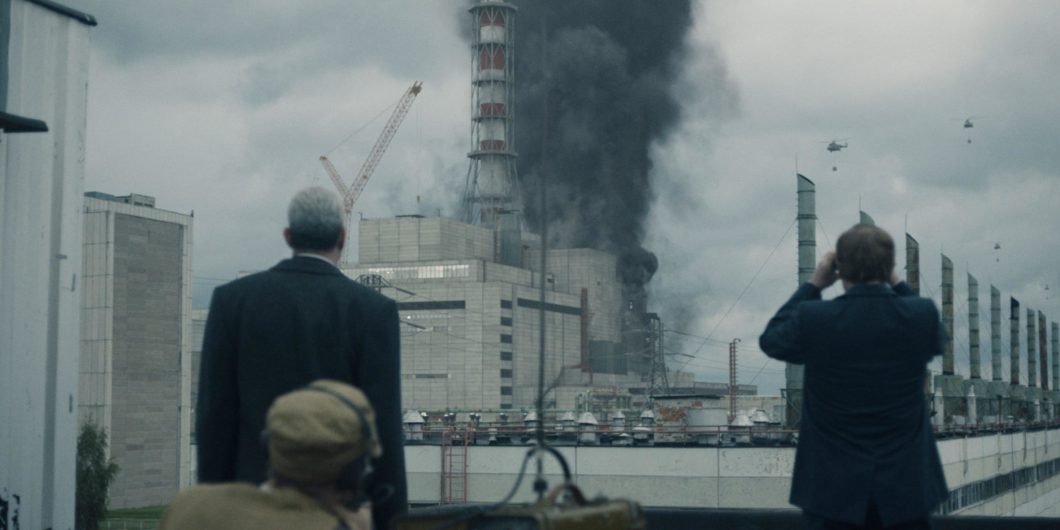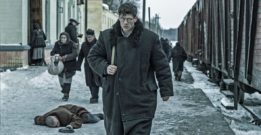Mr. Jones shows that a caricature of life, once enacted, turns deadly.
Chernobyl: A Tale of Science and the Soul
The HBO miniseries Chernobyl, written by Craig Mazin and directed by Johan Renck, has been widely acclaimed and seems to have struck a chord with audiences. Mazin and Renck tell the story of the 1986 explosion of the Soviet nuclear reactor primarily through the stories of three individuals who find themselves at the center of the effort to confront and contain the aftermath.
Boris Shcherbina (Stellan Skarsgård) is the apparatchik charged with managing the effort. Valery Legasov (Jared Harris) is an employee of the Kurchatov Institute for Atomic Energy who’s invited to support Shcherbina as an advisor. And Ulana Khomyuk (Emily Watson) is a scientist from an atomic energy institute in Minsk (the nuclear plant is between there and Kiev) who discovers the magnitude of the disaster by her own efforts and manages to find Legasov and join his team. While Shcherbina and Legasov are real figures, Khomyuk was invented for dramatic purposes and to represent, in one character, the many scientists who assisted Shcherbina and Legasov in assessing and containing the catastrophe.
Piercing the Pseudo-Reality
The series is a compelling portrayal of what the great Russian writer and dissident Aleksandr Solzhenitsyn called “The Lie as a Form of Existence”—one of the constitutive elements of life under communism. What Solzhenitsyn means by this phrase is the pseudo-reality created by the ideological imperatives of the regime. The “Lie” is omnipresent, inescapable, and amorphous all at once. No matter one’s position in society, the vibrancy of communism, and its superiority to other systems, must be constantly affirmed. The Party—as the agent of history—is the self-appointed organ whose tentacles reach into every corner of life to ensure the Lie’s articulations are embraced by all. Everyone learns particularly useful phrases that signal conformity and that might gain him or her advancement, or at least stave off getting in trouble with the authorities.
“Not one single speech, nor one single essay or article nor one single book,” says Solzhenitsyn, “can exist without the use of these primary clichés. In the most scientific of texts it is required that someone’s false authority or false priority be upheld somewhere, and that someone be cursed for telling the truth; without this lie even an academic work cannot see the light of day.”
In Chernobyl we watch as false authorities and false priorities are constantly affirmed, with horrific consequences. Khomyuk enters the action in the second episode and Legasov soon tasks her with trying to ascertain the causes of the explosion. Legasov has decided he will be the accursed truth-teller who finds that he cannot conform—he must act to prompt the regime into a response appropriate to the real magnitude of the nuclear meltdown.
The show’s most compelling story within this framework is the relationship between Legasov and the Central Committee member, Shcherbina. The latter is at first repelled by what he perceives as Legasov’s insolence and arrogance. Shortly after the initial tension-filled meeting, the apparatchik threatens to have the physicist thrown out of a helicopter.
Does science have a voice with which it can speak to non-scientists? How can science be a mover of men, in the political sense? These questions come to the fore again and again. While Legasov must help Shcherbina grasp the reality of the explosion—and its likely effects on people and the surrounding environment—Shcherbina must show Legasov that human beings are not moved like atomic particles. However accurately the physicist is able to gauge radiation levels and likelihoods of contamination, these truths might well be impotent against the seemingly immovable bureaucracy dedicated to protecting the reputation and honor of the Soviet Union.
Awakening of an Apparatchik
In the first hours after the explosion, Shcherbina seems quite willing to follow the Party line; but once he arrives on site, his attitude changes rapidly. There he meets Nikolai Fomin (Adrian Rawlins) and Viktor Bryukhanov (Con O’Neill) (two of the three men in charge of the reactor), both of whom immediately accuse Legasov of spreading rumors about a malfunction. When Shcherbina asks them to explain how it is that graphite (a substance found only in the core of a reactor) is on top of the surrounding buildings, they have no good answers. He appears utterly repelled by their thoughtless embrace of empty phrases and utter lack of interest in discovering what really might have happened.
By episode four, Shcherbina’s frustration with the system he has heretofore inhabited with such skill reaches a boiling point. He and Legasov have had to come up with a way to remove the highly radioactive material from the roofs of the surrounding buildings so a structure can be built that will cover the open reactor. They manage to acquire, from the Germans (West), a moon rover, which can be controlled remotely. The rover, once deployed, is quickly rendered inoperative by the high radiation levels. Shcherbina disappears into a trailer and we hear him screaming into a phone: “Good! Good! I want them to hear . . . Do you think I care? I’m a dead man.” After he emerges from the trailer, he informs General Tarakanov (Ralph Ineson) and Legasov that the Kremlin government had given the West German government a “propaganda number”—a much lower radiation reading than the true one—thus the robot never could have functioned properly.
“There Is No Truth”
I found Skaarsgard’s portrayal of Shcherbina convincing and utterly engaging. One might speculate that his growing attachment to the truth, and growing devotion to Legasov, are driven by a liberating kind of fatalism given how high his own exposure has been to life-threatening levels of radiation. But this can’t be the only or even the primary explanation.
Viewers are presented with a striking contrast in Anatoly Dyatlov (Paul Ritter), a top engineer at the plant. Khomyuk travels to a Moscow hospital to interview Dyatlov and his colleagues, hoping to learn the cause of the calamity. Dyatlov knows his days are numbered (he’s a very sick man due to the radiation poisoning) and that he will certainly be scapegoated by the regime. He has absolutely nothing to lose by answering Khomyuk’s questions yet he remains completely indifferent to her quest. She is stunned by his lack of curiosity about what made the reactor [only one exploded] break down. Dyatlov replies: “You think the right question will get you the truth? There is no truth. Ask the bosses whatever you want. You will get the lie. And I will get the bullet.”
Though Dyaltov has now demonstrated his incompetence both as an engineer and as a metaphysician, he’s not wrong about the bosses. His assertion about truth is what separates him from Shcherbina and what makes him, in Hannah Arendt’s phrase, “an ideal subject of totalitarian rule.”
Shcherbina’s newfound resistance to the Party he has served throughout his life is based on his somehow remaining in touch with the truth—evident most of all in his respect for human beings as self-movers, as free to confront the mostly ugly necessities of life. In watching the series and reading the scripts, one is struck by the prominence of the language of necessity. The disaster brings a host of necessities in its wake, and Legasov’s acts of defiance are based on his superior understanding of the necessities at work in the explosion.
We must remember too that communism itself is born of a pseudo-science of history, which purports to lay bare the necessities at work in the human realm—once understood, human beings would be able to become whole again by living in accordance with history’s inescapable laws. To be free, under this doctrine, is to embrace the necessity to which all are bound.
As Pierre Manent once noted,
Totalitarianism was the attempt to fuse together science and life. In communism, the fusion was forced through the despotism of ‘science’ understood vulgarly. In Nazism, the fusion came through the despotism of ‘life,’ again, understood in an utterly vulgar way.
The illusory necessities of history give rise to a politics of mendacity and compulsion.
Matter That Resists
There’s a particularly revealing moment in the second episode. Legasov and Shcherbina are meeting with workers from the surrounding reactors to recruit volunteers for a dangerous mission: They must reach the water tanks beneath the reactor, which Legasov had earlier assumed were empty but are in fact full. They must do so before the heat from the rapidly melting core turns the water to steam, which would set off a thermal explosion. There are sluice gates that can be opened to drain the water, but this can only be done by hand.
Legasov delivers this news and asks who is willing to go. He offers promotions and 400 rubles to anyone who performs this dangerous, perhaps life-ending, task. One worker is incredulous at the disproportion between the task and the reward. You’re the people who created this disaster, he says, and now you want us to risk our lives to arrest it? For a few hundred rubles? The physicist lapses into embarrassed silence. Shcherbina then stands and offers this:
You’ll do it because no one else can, and if you don’t, millions will die. And if you tell me that’s not enough, I won’t believe you. This is what has always set our people apart. A thousand years of sacrifice in our veins. And every generation must know its own suffering. I spit on the men who did this. And I curse the price I have to pay. But I am making my peace with it. You make yours. And go into the water. Because it must be done.
Three men volunteer—and what happens to them makes for a great climax.
The series concludes in July 1987 with a trial in the city of Chernobyl. Legasov and Shcherbina are both asked to give expert testimony to aid the prosecution’s case against the incompetent men in charge of the reactor that day. However, Khomyuk, in the course of her inquiry into the causes of the explosion, has discovered a design flaw in the reactor that enabled the explosion even after the shut-down protocols were engaged. Legasov must decide whether he will speak about this openly and truthfully during the trial.
During a break, Shcherbina and Legasov are chatting outside the courtroom, and the former is reflecting on his career. He tells Legasov that he was convinced that the explosion wasn’t serious at first precisely because they put him in charge. “I’m an inconsequential man, Valery. That’s all I’ve ever been.” Legasov is stunned by this self-assessment. He reminds Shcherbina that he was the one who obtained everything they needed to respond—men, materiel, everything. Legasov says many physicists could have done what he himself did. “They heard me,” he says, “but they listened to you. Of all the ministers and all the deputies—the entire congregation of obedient fools—they mistakenly sent us the one good man. For god’s sake, Boris—you were the one who mattered most.”
As a scientist, Legasov understands the limits of science. It seems the universe, as Harvey Mansfield once explained, “is divided into matter that does not resist and matter that does, and the science that explains the first by deterministic laws does not fully or adequately explain the second.” The physicist and the communist official have both spent their lives accommodating themselves to a political system dedicated to concealing the reality of the human soul. Each in their own way recoiled from lies that led to easily avoidable human suffering. The scientist could not abide the refusal to face harsh necessities of nature. The political man could not abide the dishonesty about the required human response.
If, as Mansfield suggests, “soul follows from the human ability to react and resist as well as to transcend,” then perhaps each man’s resistance is grounded and encouraged as each watches that resistance in his counterpart. Friendship makes the reality of the human soul visible once again.



